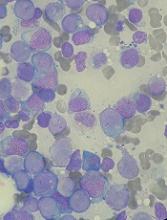Researchers have discovered the first leukemia-protective gene that is specific to the Y chromosome, according to an article published in Nature Genetics.
The researchers were investigating how loss of the X-chromosome gene UTX hastens the development of acute myeloid leukemia (AML).
However, they found that UTY, a related gene on the Y chromosome, protected male mice lacking UTX from developing AML.
The researchers then found that, in AML and other cancers, loss of UTX is accompanied by loss of UTY.
“This is the first Y chromosome-specific gene that protects against AML,” said study author Malgorzata Gozdecka, PhD, of the Wellcome Sanger Institute in Hinxton, UK.
“Previously, it had been suggested that the only function of the Y chromosome is in creating male sexual characteristics, but our results indicate that the Y chromosome could also protect against AML and other cancers.”
For this work, Dr Gozdecka and her colleagues studied the UTX gene in human cells and mice.
In addition to their discovery that UTY acts as a tumor suppressor gene, the researchers uncovered a new mechanism for how loss of UTX leads to AML.
They discovered that UTX acts as a common scaffold, bringing together a large number of regulatory proteins that control access to DNA and gene expression, a function that can also be carried out by UTY.
Specifically, the team said UTX suppresses AML by repressing oncogenic ETS and upregulating tumor-suppressive GATA programs. And loss of UTX leads to “altered patterns of gene expression that induce and maintain” AML.
“Treatments for AML have not changed in decades, and there is a large unmet need for new therapies,” said study author George Vassiliou, PhD, of the Wellcome Sanger Institute.
“This study helps us understand the development of AML and gives us clues for developing new drug targets to disrupt leukemia-causing processes. We hope this study will enable new lines of research for the development of previously unforeseen treatments and improve the lives of patients with AML.”


